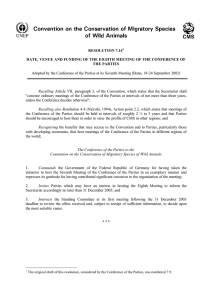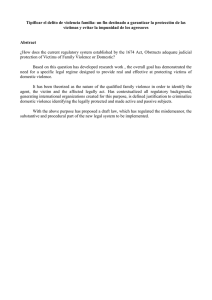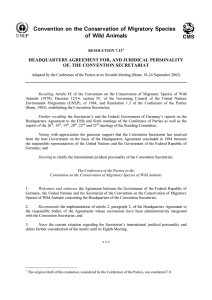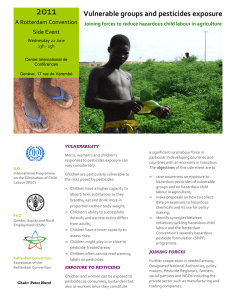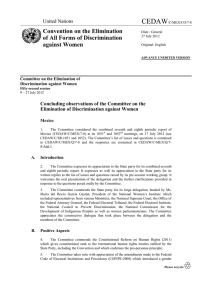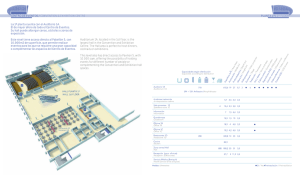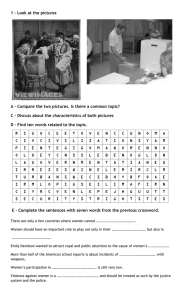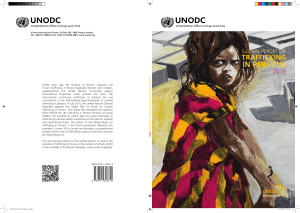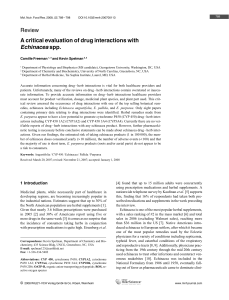cedaw/c/cyp/co/6-7
Anuncio
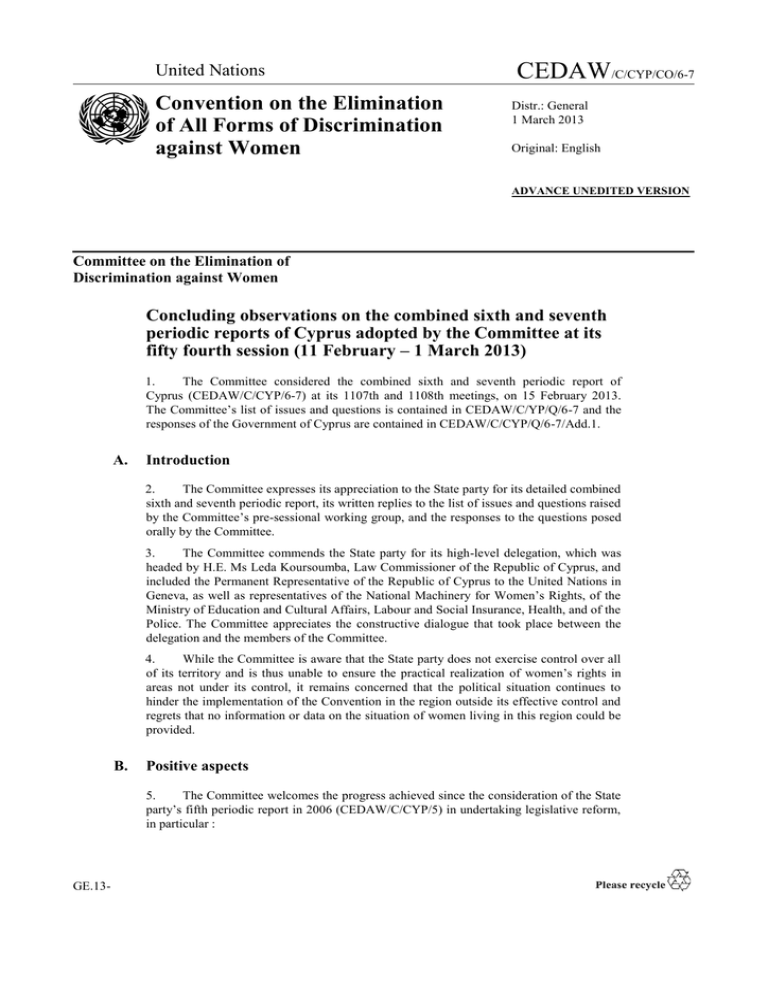
United Nations Convention on the Elimination of All Forms of Discrimination against Women CEDAW/C/CYP/CO/6-7 Distr.: General 1 March 2013 Original: English ADVANCE UNEDITED VERSION Committee on the Elimination of Discrimination against Women Concluding observations on the combined sixth and seventh periodic reports of Cyprus adopted by the Committee at its fifty fourth session (11 February – 1 March 2013) 1. The Committee considered the combined sixth and seventh periodic report of Cyprus (CEDAW/C/CYP/6-7) at its 1107th and 1108th meetings, on 15 February 2013. The Committee’s list of issues and questions is contained in CEDAW/C/YP/Q/6-7 and the responses of the Government of Cyprus are contained in CEDAW/C/CYP/Q/6-7/Add.1. A. Introduction 2. The Committee expresses its appreciation to the State party for its detailed combined sixth and seventh periodic report, its written replies to the list of issues and questions raised by the Committee’s pre-sessional working group, and the responses to the questions posed orally by the Committee. 3. The Committee commends the State party for its high-level delegation, which was headed by H.E. Ms Leda Koursoumba, Law Commissioner of the Republic of Cyprus, and included the Permanent Representative of the Republic of Cyprus to the United Nations in Geneva, as well as representatives of the National Machinery for Women’s Rights, of the Ministry of Education and Cultural Affairs, Labour and Social Insurance, Health, and of the Police. The Committee appreciates the constructive dialogue that took place between the delegation and the members of the Committee. 4. While the Committee is aware that the State party does not exercise control over all of its territory and is thus unable to ensure the practical realization of women’s rights in areas not under its control, it remains concerned that the political situation continues to hinder the implementation of the Convention in the region outside its effective control and regrets that no information or data on the situation of women living in this region could be provided. B. Positive aspects 5. The Committee welcomes the progress achieved since the consideration of the State party’s fifth periodic report in 2006 (CEDAW/C/CYP/5) in undertaking legislative reform, in particular : GE.13- CEDAW/C/CYP/CO/6-7 (a) The enactment, in 2007, of the Combating of Trafficking and Exploitation of Human Beings and the Protection of Victims Law; and (b) Amendments, in 2009, to the Laws on Equal Treatment of Men and Women in Employment and Vocational Training and the Equal pay between Men and Women for the Same Work or for Work of Equal Value. 6. The Committee commends the State party for improving its institutional and policy framework aimed at accelerating the elimination of discrimination against women and promoting gender equality, such as : (a) The adoption of the National Action Plan on Gender Equality (2007-2013) in 2007, as well as the establishment of the Human Rights and Equal Opportunities for Men and Women Parliamentary Committee and the Gender Equality Committee in Employment and Vocational Training; (b) The adoption of the National Action Plan on Prevention and Handling of Family Violence (2010-2013), in 2009, and the establishment of the Advisory Committee for the Prevention and Combating of Domestic Violence; and (c) The adoption of the National Action Plan against Trafficking in Human Beings (2013-2015), in 2010, and the establishment of a Multidisciplinary Coordinating Group for Combating Trafficking in Human Beings. 7. The Committee welcomes the fact that, in the period since the consideration of the previous report, the State party has ratified or acceded to the following international and regional instruments: (a) The Convention on the Rights of Persons with Disabilities (2011); (b) The Optional Protocol to the Convention on the Rights of Persons with Disabilities (2011); (c) The Optional Protocol to the Convention on the Rights of the Child on the Involvement of Children in Armed Conflict (2010); (d) The Optional Protocol to the Convention against Torture and other Cruel, or Inhuman or Degrading Treatment or Punishment (2009); and (e) The Council of Europe Convention on Action against Trafficking in Human Beings (2006). C. Principal areas of concern and recommendations House of Representatives 8. While reaffirming that the Government has the primary responsibility and is particularly accountable for the full implementation of the obligations of the State party under the Convention, the Committee stresses that the Convention is binding on all branches of Government and invites the State party to encourage the House of Representatives, in line with their procedures and where appropriate, to take the necessary steps with regard to the implementation of the present concluding observations between now and the next reporting process under the Convention. Access to justice 9. While noting that women increasingly use the existing gender equality bodies to seek redress, the Committee is concerned that women remain reluctant, as acknowledged by the State party, to bring complaints about discrimination and violations of their rights to 2 CEDAW/C/CYP/CO/6-7 courts and tribunals, and that lawyers and law enforcement officers are not sufficiently trained on the application of rights under the Convention. 10. The Committee recommends that the State party enhance women's awareness of their rights, including among migrant women, remove any impediments faced by women in gaining effective access to justice, including access to judicial remedies and other legal complaints mechanisms. It further calls on the State party to establish training programmes for prosecutors, judges and lawyers, which focus on the Convention, the Optional Protocol and the Committee’s general recommendations, so as to establish a legal culture supportive of gender equality. National machinery for the advancement of women 11. While commending the State party for having established a number of equality bodies during the period under review, the Committee is concerned that the State party’s National Machinery for Women’s Rights (NMWR), which consists of four different bodies, is fragmented and lacks sufficient authority and visibility, and that the Equality Unit lacks adequate human and financial resources, as well as technical capacity to effectively carry out its mandate. The Committee is also particularly concerned about the lack of coordination among the existing entities, resulting in overlapping responsibilities. 12. The Committee reiterates its recommendation in its previous concluding observations (CEDAW/C/CYP/CO/5, para. 16) that the State party strengthen the existing national machinery, by providing it with adequate authority, visibility, as well as human, financial and technical resources and establish effective coordination among all the existing bodies for the advancement of women and the promotion of gender equality. Temporary special measures 13. While noting the State party’s schemes to provide incentives for the employment of disadvantaged or vulnerable persons, the Committee is concerned that no temporary special measures are planned to be applied as part of a strategy to accelerate the achievement of substantive equality between women and men in areas where women are underrepresented or disadvantaged, particularly in the labour market and in political and public life. 14. The Committee encourages the State party to: (a) Study and consider the relevance and suitability of applying quotas and other forms of temporary special measures, in accordance with article 4, paragraph 1, of the Convention, and the Committee’s general recommendation No. 25 (2004), in all areas covered by the Convention where women are underrepresented or disadvantaged, in particular in the labour market and in political and public life; (b) Raise awareness among members of Parliament, government officials, political parties and the general public about the necessity of special temporary measures; and (c) Incorporate provisions for the use of temporary special measures, as part of a necessary strategy towards the achievement of women’s substantive equality in all its policies, programmes and plans of action, in both the public and private sectors. Stereotypes 15. While recognizing the State party’s efforts to eliminate gender stereotypes, notably through its ongoing educational reform, the Committee reiterates its concern (CEDAW/C/CYP/CO/5, para. 17) about the persistence of patriarchal attitudes and deep3 CEDAW/C/CYP/CO/6-7 rooted stereotypes regarding the roles and responsibilities of women and men in the family, in the workplace, in political and public life and in society at large. In particular, the Committee notes with concern that the prevalence of such stereotypes contributes to women’s disadvantaged position in the State party, in particular regarding their access to decision-making positions and elected office, affect their educational and professional choices and ultimately their position in the labour market. 16. The Committee recommends that the State party: (a) Adopt a comprehensive strategy, across all sectors, with a result-oriented approach to overcome stereotypical attitudes that discriminate against women in the family, education, the workplace, political and public life and in the wider society; and (b) Develop awareness-raising and educational campaigns, targeting women and men at all levels of society, including in the educational system, as well as in public and private sectors, in collaboration with civil society and the media, including by promoting non-stereotypical and positive images of women’s active participation in social, economic and political life and by disseminating knowledge about the Convention and its concept of substantive gender equality. Violence against women 17. The Committee welcomes the State party’s efforts to combat domestic violence, in particular the adoption of a comprehensive legislative framework, the conduct of national research on the prevalence of domestic violence and professional training provided to the police by the Police Domestic Violence and Child Abuse Office. However, the Committee remains concerned about the low number of investigations, prosecutions and convictions in cases of domestic violence, despite the high number of cases reported. The Committee is further concerned about the lack of information on the implementation of the National Action Plan on Prevention and Handling of Family Violence (2010-2013), the insufficient gender perspective and lack of inclusion of migrant women and ethnic minorities in the State party’s programmes and policies regarding domestic violence, as well as the limited assistance provided by the only NGO-run shelter in the State party. The Committee further expresses concern about the limited data and information available on the incidence of other forms of violence. 18. The Committee recommends that the State party: (a) Take effective measures to investigate reported acts of all forms of violence, as well as prosecute and adequately punish perpetrators, including by providing mandatory training to judges, prosecutors and lawyers and providing legal aid to victims ; (b) Effectively implement its National Action Plan on Prevention and Handling of Family Violence within a specified time frame and with sufficient budget allocation, as well as systematically monitor its impact; (c) Enhance the data collection system to include all forms of violence against women, protection measures, prosecutions and sentences imposed on perpetrators, and conduct appropriate surveys to assess the prevalence of violence experienced by women, including migrant women and women belonging to ethnic minorities; (d) Provide adequate assistance and protection to women victims of violence, in particular social rehabilitation and an adequate number of shelters, including by strengthening its cooperation with and support to non-governmental organizations offering shelter and other forms of support to victims of domestic violence; and 4 CEDAW/C/CYP/CO/6-7 (e) Set a timeframe for the ratification of the Council of Europe Convention on preventing and combating violence against women. Trafficking and exploitation of prostitution 19. The Committee notes with satisfaction that the anti-trafficking legislation contains provisions for the identification and protection of victims and that a national referral mechanism for victims and a government-run shelter were established. However, the Committee is concerned about the low conviction rate for traffickers, whereas the number of identified trafficking victims is high, as well as the limited assistance provided to victims by the existing shelter and to those victims who are unable or unwilling to cooperate with the prosecution authorities. The Committee is also concerned about the prevalence of trafficking for the purpose of sexual and labour exploitation of migrant women, as well as the insufficient enforcement of the regulatory framework and the lack of monitoring of private employment agencies which are reportedly sometimes involved in trafficking networks. While noting the abolishment of the “performing artist” visa which facilitated trafficking, the Committee notes with concern the negative repercussions of the new visa regime on migrant women coming from EU countries who are increasingly trafficked for exploitation in new forms of establishments, other than cabarets, such as private apartments. The Committee regrets the absence of information about the prevalence of prostitution in the State party and about exit programmes for women seeking other livelihoods. 20. The Committee calls on the State party to: (a) Increase its efforts to effectively investigate acts of trafficking and to prosecute and punish perpetrators; (b) Provide adequate assistance and protection to all victims of human trafficking, irrespective of their capacity or willingness to cooperate in the legal proceedings against traffickers, and ensure that such assistance includes psychological support, rehabilitation and social reintegration; (c) Take effective measures to strictly enforce existing legislation pertaining to private employment agencies and monitor their activities, with a view to preventing the trafficking of migrant women as domestic workers and consider ratifying the ILO Convention No. 181 concerning private employment agencies (1997); (d) Ensure a strict control of the new visa regime so that it does not facilitate or result in trafficking of migrant women, and conduct an impact assessment of the regime currently in place; and (e) Develop strategies to prevent exploitation of prostitution and implement programmes to support and provide rehabilitation for sex workers seeking alternative livelihoods. Participation in political and public life 21. The Committee reiterates its concern (CEDAW/C/CYP/CO/5, para. 19) that women continue to be underrepresented in government, Parliament, local councils, as mayors, and in decision-making positions in the public administration, as acknowledged by the State party. It notes with concern that patriarchal attitudes towards female politicians, lack of support from male political networks and insufficient media representation prevent women from equal participation in political life. Further, while the Committee notes that most political parties have introduced quotas to enhance the participation of women in their decision-making bodies, it expresses deep concern at the State party’s indication that the use of quotas in public and political life is not supported by the Government or by civil 5 CEDAW/C/CYP/CO/6-7 society. It is also concerned that the targets and quotas included in the NAPGE for the participation of women in political and public life have not resulted in the implementation of any concrete measures. 22. The Committee urges the State party to: (a) Increase its efforts to conduct awareness-raising campaigns on the importance of women’s participation in political life, in cooperation with the media; and (b) Take all necessary measures to increase the representation of women in elected and appointed bodies, particularly in the executive, legislative and at decisionmaking levels, with a view to reaching the targets and quotas included in the NAPGE, and consider adopting, wherever necessary, temporary special measures, in order to accelerate women’s full and equal participation. Participation in the peace process 23. While noting that women are actively involved in the promotion of reconciliation and peace through bi-communal activities, the Committee notes with concern the insufficient information provided by the State party on the participation of women in the peace process, including at decision-making levels, and is concerned that the peace process currently underway may lack a gender perspective, as called for in the recommendations of the Gender Advisory Team. 24. With reference to its previous recommendation (CEDAW/C/CYP/CO/5, para. 34), the Committee calls on the State party to: (a) Strengthen its dialogue with non-governmental and women’s organisations to promote and encourage civil society and community-level participation in the peace process; (b) Increase its efforts to incorporate a gender perspective in the peace process by ensuring the protection and respect for women’s and girls’ human rights and by addressing their specific needs; and (c) Fully involve women in all stages of the peace process, including in decision-making, in line with United Nations Security Council Resolution 1325 (2000). Education 25. While noting with satisfaction the adoption of an Action Plan on Gender Equality in Education which provides for measures that address traditional gender roles and stereotypes in the family and in society, the Committee is concerned about the lack of evaluation of the implementation of the Action Plan. The Committee is also concerned about the concentration of women in traditionally women-dominated fields of study in tertiary education and their under-representation in technical and vocational education. Further, the Committee is concerned about the economic, linguistic and cultural challenges that girls belonging to ethnic minorities experience, which affect their academic performance and ultimately their transition to the labour market. 26. The Committee recommends that the State party: (a) Undertake an assessment of the impact of the measures undertaken under the Action Plan; (b) Develop measures aiming at the diversification of women’s academic and professional choices, including in non-traditional fields and increase its efforts to 6 CEDAW/C/CYP/CO/6-7 provide career counselling for girls in order to promote their choice of non-traditional career paths; (c) Intensify its efforts to remove economic, linguistic and cultural barriers faced by girls belonging to ethnic minorities, including Turkish Cypriot girls, in attaining a standard of performance which facilitate their successful transition into further studies or the labour market. Employment 27. While commending the State party on its adoption of comprehensive legislation in the employment sector, promoting women’s entrepreneurship and developing measures aimed at reconciling work and family responsibilities, the Committee notes with concern that the wage gap between women and men remains at 18.3%. In addition, while noting the efforts of the Inter-Ministerial Committee in regulating domestic work, the Committee expresses deep concern at the precarious situation and vulnerability of domestic workers in the State party, most of whom are migrant women, as well as at the absence of a monitoring system of their working conditions. In particular, it notes the strikingly high number of complaints brought by domestic workers before the District Labour Relations Office (2867 since 2010) which points to the insufficient measures taken by the State party to protect them. 28. The Committee urges the State party to: (a) Take proactive measures to monitor and close the gender wage gap, including through evaluation systems based on gender-sensitive criteria; (b) Undertake systematic labour inspections to monitor the terms of the employment of domestic workers, including their wages and working conditions, and intensify its efforts to protect their rights; and (c) Consider ratifying the ILO Convention No. 189 concerning decent work for domestic workers (2011). Health 29. While noting that, according to a decision of the Council of Ministers, the National Health Insurance System will be implemented by 2016, the Committee notes with concern that the absence of a national health system and subsequent lack of universal care negatively impact on access to health services for low income groups of women, in particular for migrant women and older women. The Committee is also concerned about the reported difficulties in obtaining affordable contraceptives for disadvantaged groups of women and about the unavailability of some methods of modern contraception in the State party. Further, the Committee regrets the lack of data on unsafe abortions in the State party. 30. The Committee calls on the State party to: (a) Ensure universal access to health care and services for all women, with particular attention to migrant and elderly women, as well as the swift implementation of the National Health Insurance System; (b) Provide a comprehensive range of affordable contraceptives and family planning methods, including emergency contraception, and ensure that all women and girls, including migrant women and girls do not face economic, linguistic or cultural barriers in accessing family-planning information and services; and (c) Conduct research on unsafe abortions in the State party and their impact on women’s health and maternal mortality, and include such information in its next periodic report. 7 CEDAW/C/CYP/CO/6-7 Disadvantaged groups of women 31. The Committee expresses its concern about the vulnerable situation of older women and women with disabilities, who often suffer multiple forms of discrimination, especially with regard to access to education, employment, adequate housing, health care and social services. It regrets the limited information provided by the State party in this regard. 32. The Committee requests the State party to include detailed information, including disaggregated data and information on specific programmes and achievements, on the situation of older women and women with disabilities in its next periodic report. 33. The Committee notes with concern that the legislation of the State party continues to discriminate against children of women with internally displaced status, by preventing them from benefitting from the same status awarded to children of internally displaced men, which includes access to voting rights, social benefits and housing assistance. 34. The Committee urges the State party to amend its legislation without delay to ensure that children of women with internally displaced status are able to benefit from the same status as children of internally displaced men. Marriage and family relations 35. The Committee is concerned about the insufficient information provided by the State party regarding marriage and family relations, including dissolution of marriage. While noting that the jurisdiction over divorce proceedings was fully transferred to the Family Courts by constitutional amendment in 1989, the Committee notes with concern that the continued jurisdictional split of the Family Courts based on religion affiliation and the lack of a uniform law governing divorce, resulting from the co-existence of specific laws which apply to the different respective religious groups, as well as the current legislation on the division of marital property may negatively impact on women. Further, while noting that the Ministry of Interior submitted a proposal for a draft law regulating de facto unions which was recently discussed before the Council of Ministers, the Committee is concerned that women in these unions are not sufficiently protected, including in cases of separation. 36. The Committee recommends that the State party: (a) Ensure that all the laws on marriage and family relations governing the different religious groups are applied by the Family Courts in full compliance with articles 15 and 16 of the Convention and the General Recommendation No. 21 (1994) on equality in marriage and family relations; (b) Undertake research on the economic consequences of divorce on both spouses, bearing in mind gender-based economic disparities between spouses; and (c) Take all the necessary measures, including through the envisaged draft law regulating de facto unions, to ensure that women enjoy adequate legal protection during de facto unions and upon their dissolution. Data collection and analysis 37. While noting that the State party’s Statistical Service has recently published an updated version of “The Statistical Portrait of Women in Cyprus” which contains sex disaggregated data on employment, education, health, poverty and participation on public life and violence, the Committee regrets that insufficient updated statistical information disaggregated by sex was provided in many areas covered by the Convention. 38. The Committee recommends that the State party include in its next report statistical data and analysis, disaggregated by sex and by rural and urban areas, 8 CEDAW/C/CYP/CO/6-7 indicating the impact of measures taken and their results in order to illustrate more comprehensively the situation of women in several areas, including with respect to migrant women. Beijing Declaration and Platform for Action 39. The Committee calls upon the State party to utilize the Beijing Declaration and Platform for Action, in its efforts to implement the provisions of the Convention.. Dissemination 40. The Committee recalls the obligation of the State party to systematically and continuously implement the provisions of the Convention on the Elimination of All Forms of Discrimination against Women. It urges the State party to give priority attention to the implementation of the present Concluding Observations and recommendations between now and the submission of the next periodic report. The Committee therefore requests the timely dissemination of the concluding observations, in the official language(s) of the State party, to the relevant state institutions at all levels (national, regional, local), in particular to the Government, the ministries, the House of Representatives and to the judiciary, to enable their full implementation. It encourages the State party to collaborate with all stakeholders concerned, such as employers’ associations, trade unions, human rights and women’s organisations, universities and research institutions, media, etc. It further recommends that its Concluding Observations be disseminated in an appropriate form at the local community level, to enable their implementation. In addition, the Committee requests the State party to continue to disseminate the CEDAW Convention, its Optional Protocol and jurisprudence, and the Committee’s General Recommendations to all stakeholders. . Ratification of other treaties 41. The Committee notes that the adherence of the State party to the nine major international human rights instruments1 would enhance the enjoyment by women of their human rights and fundamental freedoms in all aspects of life. The Committee therefore encourages the State party to consider ratifying the treaties to which it is not yet a party, i.e., the International Convention on the Protection of the Rights of All Migrant Workers and Members of their Families and the International Convention for the Protection of All Persons from Enforced Disappearance. Follow-up to concluding observations 42. The Committee requests the State party to provide, within two years, written information on the steps undertaken to implement the recommendations contained in paragraphs 12 and 20 b), c) and d) above. . 1 The International Covenant on Economic, Social and Cultural Rights; the International Covenant on Civil and Political Rights; the International Convention on the Elimination of All Forms of Racial Discrimination; the Convention on the Elimination of All Forms of Discrimination against Women; the Convention against Torture and Other Cruel, Inhuman or Degrading Treatment or Punishment; the Convention on the Rights of the Child; the International Convention on the Protection of the Rights of All Migrant Workers and Members of Their Families; the International Convention for the Protection of All Persons from Enforced Disappearance; and the Convention on the Rights of Persons with Disabilities. 9 CEDAW/C/CYP/CO/6-7 Preparation of the next report 43. The Committee invites the State party to submit its eighth periodic report in March 2017. 44. The Committee requests the State party to follow the “Harmonized guidelines on reporting under the international human rights treaties, including guidelines on a common core document and treaty-specific documents” (HRI/MC/2006/3 and Corr.1). 10
